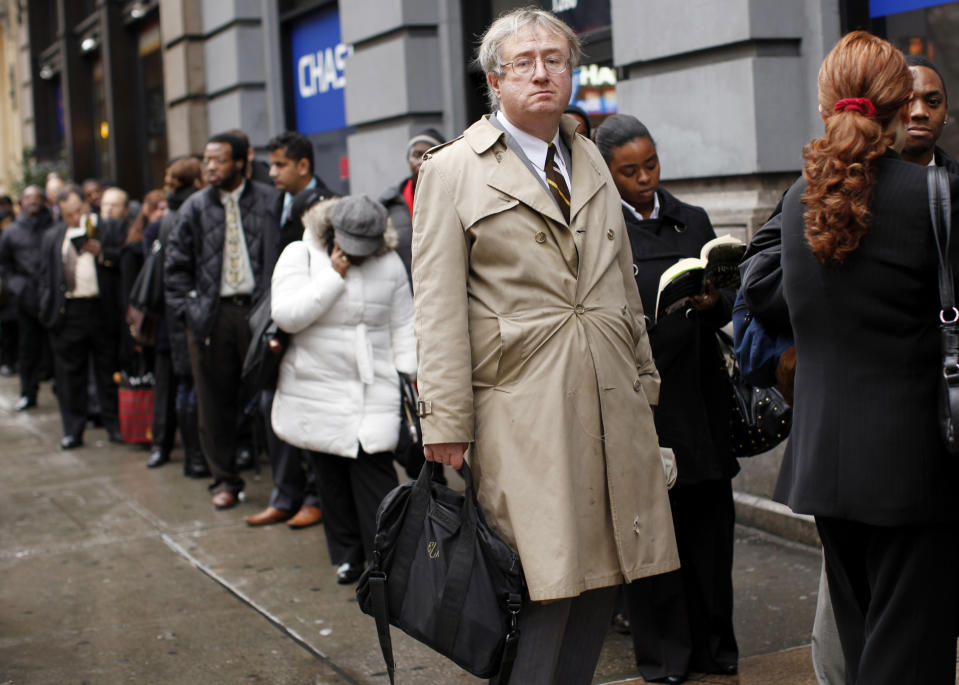Personal bankruptcies plunge during pandemic, but 'a flood' could be on the horizon
Even as the coronavirus pandemic battered the economy, forcing tens of millions of workers to file for unemployment and shuttering businesses large and small, a surprising trend emerged: The number of people filing for personal bankruptcy plunged.
In April, consumer bankruptcies dropped 47% from the same month last year, while May filings were down 43% year over year, according to the American Bankruptcy Institute. For the first half of the year, bankruptcies were 24% lower than the first six months of last year.
Experts pointed to numerous factors for the slowdown.
Courts and attorneys’ offices remained closed during state shutdowns. Evictions and foreclosures — often precursors to bankruptcy because people want to save their homes — were put on hold. Generous government support and forgiving creditors also kept many from falling into financial distress. Last, those on the brink of bankruptcy before the pandemic had more pressing issues to deal with.
“People’s mental inboxes are full,” Professor Robert Lawless at the University of Illinois College of Law, who specializes in bankruptcy, consumer finance and business law, told Yahoo Money. “There are a lot of things to sort out in their lives — going to see a bankruptcy lawyer has been pushed further down on the to-do list for understandable reasons. I think that was a big part in the early days and weeks of the pandemic.”
But the reprieve may be short-lived as the economy sputters, stopping and going as new COVID-19 outbreaks pop up, and as many of the temporary layoffs morph into permanent ones.
‘There will be a flood of bankruptcies’ come fall
“As government lifelines to help stabilize the economy begin to expire, bankruptcy provides a shield for households and companies facing intensifying financial distress,” ABI Executive Director Amy Quackenboss said in a statement earlier this week, announcing the half-year bankruptcy statistics. “We anticipate filings to begin increasing as a result.”
How quickly people file for bankruptcy and how many will do so remain unclear, but bankruptcy attorney George Wade in Alexandria, Virginia, isn’t very optimistic.

“Everyone who files for unemployment is a potential bankruptcy,” he said, noting that many of those who lost jobs won’t be getting them back. “We’re in a state of suspended animation because the government is picking things up.”
What happens, he asked, when many of the outside forces keeping people afloat are removed, starting with the expiration of the extra $600 in unemployment benefits at the end of the month and then the eventual resumption of evictions and foreclosures?
“In the fall, there will be a flood of bankruptcies,” he said. “I think it will be a bloodbath.”
The ‘gradual’ argument
Lawless is more skeptical. His past research on bankruptcies shows that people take a long time to choose bankruptcy, typically struggling through financial difficulties between two to five years before filing. Oftentimes, they are finally persuaded after a creditor sues them.
“It’s not like if people get laid off from a job today that they file for bankruptcy tomorrow,” he said. “It has a very long tail.”
Lawless also noted that bankruptcy doesn’t find unemployed people jobs; it solves debt problems. “If they don’t have debt, they don’t file for bankruptcy,” he said.

Debt — rather than job loss — has a tighter macroeconomic correlation with bankruptcy, going back to the explosion of filings in the late 1990s during the dot.com boom and then the increase during the Great Recession. Both of those periods were punctuated by high consumer debt.
Before the pandemic, consumer credit also had been rising, approaching but not yet reaching levels seen before 2008. But that doesn’t mean Lawless doesn’t expect an increase in filings as the pandemic and its rolling economic effects continue. He just expects many Americans to turn to other debt to sustain them until they finally reach a breaking point.
“I think there will be more bankruptcies, but the shape of that curve may be more of a gradual run-up as debt problems accumulate,” he said. “We may look out two years from now and see there were a lot more people filing.”
Janna is an editor for Yahoo Money and Cashay. Follow her on Twitter @JannaHerron.
Read more:
The IRS is failing to collect billions in back taxes owed by super rich Americans
How the extended tax deadline affects payments, retirement contributions, and more
Tax expert: Americans who don't file leave ‘billions of dollars’ on the table
Read more personal finance information, news, and tips on Cashay

 money
money 
